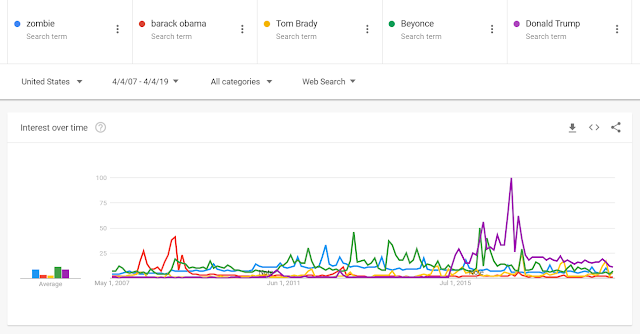I'm giving a couple of talks next week at Wofford College. One of them will be about my 2017 article "Laughing off a Zombie Apocalypse: The Value of Comedic and Satirical Narratives." Preparing for the talk, I became curious as to the continued popularity of zombies. Scholars who study popular culture have to be on the alert for changes that might leave them studying an unpopular phenomenon.
I know "The Walking Dead" (which started in 2010) is still on television, though I have not watched it in several years. Likewise, AMC has a spinoff series called "Fear the Walking Dead" and other zombie-themed shows are still on TV: "iZombie" (I have viewed season 1 and part of 2) and "Santa Clarita Diet." Today, I discovered that the long-promised sequel to "Zombieland" is set for release this October.
This would seem to indicate that the undead are not yet dead in popular culture.
For less anecdotal evidence, I turned to Google Trends. In case you are not familar with that phrase, it is a Google application that measures "Interest over time" in particular search terms. Consider this chart of searches for "zombie" since April 4, 2007 (12 years ago today):
Google says that "Numbers represent search interest relative to the highest point on the chart for the given region and time. A value of 100 is the peak popularity for the term. A value of 50 means that the term is half as popular. A score of 0 means there was not enough data for this term."
This means that the peak time for popular interest in zombies was June 2012. There's been a steady decline, which seems worrisome.
For relative interest, I added the search term "Barack Obama"and the results were somewhat startling.
So, basically, people have for many years searched more frequently for information about zombies than they have for the President of the US through eight of those twelve years. Obama's rise to fame early in this period is the only real exception. Did people in the US take him for granted?
I added the search terms "Tom Brady" and "Beyoncé" to get a feel for relative differences with a prominent athlete and pop singer. The results are perhaps not surprising, at least to me:
Beyoncé is generally the most popular through this time, but Tom Brady and zombie occasionally emerge. Again, Obama was very popular when he burst on the presidential politics scene.
Then, I wondered how would this chart look if I added "Donald Trump"?
Trump's peak when he emerged as a presidential candidate set incredible new heights of popular attention. And since that date, Trump has maintained his lead over the other terms by a decent margin.
I played around with assorted celebrities, products, and ideas and discovered that Trump's peak isn't necessarily so impressive when considered against various non-political terms. For example, consider amazon, sex, and iPhone:
Through much of the period, zombie and Trump are neck-and-neck. Neither of those search terms are ever as popular as amazon, sex, or iPhone through this twelve year period. It's not close.
Not all of that is good news.
Visit this blog's homepage.
For 280 character IR and foreign policy talk, follow me on twitter.
Or for basketball, baseball, movies or other stuff, follow this personal twitter account.






No comments:
Post a Comment